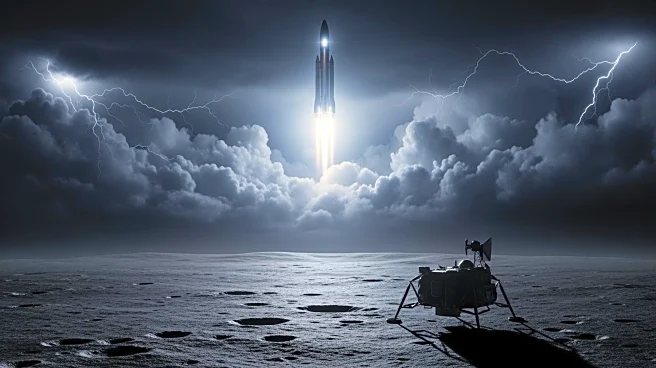What's Happening?
On November 19, 1969, NASA's Apollo 12 mission successfully landed on the Moon despite facing significant challenges during its launch. The spacecraft was struck by lightning twice shortly after liftoff,
causing a major power outage. Quick thinking by EECOM engineer John Aaron, who instructed the crew to switch the Signal Conditioning Equipment to auxiliary power, restored telemetry and allowed the mission to proceed. Astronauts Charles 'Pete' Conrad Jr. and Alan L. Bean conducted extravehicular activities, deploying scientific equipment and collecting lunar samples. The mission faced a potential risk with the parachute deployment system, but it functioned normally during splashdown.
Why It's Important?
The Apollo 12 mission demonstrated the resilience and problem-solving capabilities of NASA and its astronauts, reinforcing the importance of human ingenuity in space exploration. The successful lunar landing and subsequent activities contributed valuable scientific data, enhancing understanding of the Moon's surface and geological history. The mission's ability to overcome technical challenges underscored the robustness of NASA's operational protocols and the critical role of ground support teams. This event marked a significant milestone in the U.S. space program, paving the way for future lunar explorations and technological advancements.
What's Next?
Following Apollo 12, NASA continued to refine its mission protocols, particularly regarding launch conditions and equipment reliability. The lessons learned from the lightning strikes led to improved safety measures and contingency planning for subsequent missions. The success of Apollo 12 bolstered public and governmental support for continued lunar exploration, setting the stage for future Apollo missions and the eventual development of more advanced space technologies.
Beyond the Headlines
The Apollo 12 mission highlighted the importance of collaboration between astronauts and mission control, showcasing the human element in overcoming unforeseen challenges. The incident with the television camera, which was inadvertently damaged by direct exposure to the Sun, served as a reminder of the delicate nature of space equipment and the need for meticulous handling. The mission's success contributed to the cultural and scientific legacy of the Apollo program, inspiring generations of scientists and engineers.











